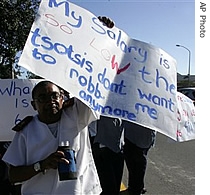2007年VOA标准英语-South Africa's Ruling Party to Mull Policy, Lea(在线收听)
Johannesburg
22 June 2007
South Africa's ruling party, the African National Congress, will hold a conference next week (June 27 - 30) to chart its policy for the next decade and prepare to elect a new leadership at its national congress in December. VOA's Delia Robertson reports from our bureau in Johannesburg.
African National Congress delegates meet next week amid simmering tension within the party and with its alliance partners over two main issues: the government's management of the economy since the beginning of ANC rule in 1994; and a likely successor to replace Thabo Mbeki as president and party leader in 2009.
 |
| South African civil servants protest outside the Red Cross children's hospital during the first day of a national public service strike in Cape Town, South Africa, 01 June 2007 |
"Because what we have seen over the past 13 years is a situation where yes, we have economic growth and economic fundamentals are sound, but the benefits of that growth have not extended significantly beyond capital and the middle class," said Matshiqi.
President Thabo Mbeki and other senior A.N.C. leaders in government argue that the government had to stabilize the economy, which was in a decline at the end of apartheid; and they say, they could only do so within the constraints of the global economy. They say that even so, management of the economy has always been focused on reducing inequalities in the society. Matshiqi, a senior political associate at Johannesburg's Center for Policy Studies, argues that the government has not yet found the right formula for ending poverty and inequality.
"The critical thing is that you need a redistribution strategy; a redistribution strategy that is targeted toward reducing inequalities and once you succeed in addressing the problem of inequality then you will be in good stead as far as addressing the problem of poverty is concerned," he said. "Because it is going to be difficult for the ANC to engage in poverty alleviation programs unless it is able to deal effectively with the issue of addressing inequalities in South African society."
Among the most vocal critics of government policy are the ANC's own alliance partners, the Congress of South African Trade Unions and the South African Communist Party, who argue that the ANC, as a ruling party, has diverted from its liberation history toward big business.
The focus of their resentment is President Mbeki and they had pinned their hopes on former deputy president Jacob Zuma stepping into his shoes in 2009. When the president fired Zuma two years ago because his financial advisor was convicted of corruption, the debate about the management of the economy and the presidential succession became intertwined and very heated.
Analyst Matshiqi says that this is not least because the ruling party has become a means toward economic power.
"Because, the ANC has become one of the main instruments of class formation in this country; and therefore accessing power directly through the ANC or having links with those who have accessed that power can advantage particular interests especially of those who want to gain more access to the benefits particularly of black economic empowerment," he said.
The intensity of these debates has been deepened because of the current strike by public servants and has prompted much speculation that the ANC will consequently shift to the left as it formulates its policies at the coming conference. Jonathan Faul, researcher at the Institute for Democracy in South Africa, argues that any major shifts are unlikely.
"It is very likely that there will be a realignment of the ANC slightly to the left of where it is currently. But certainly the ANC is not going to be taken over by COSATU and the SACP," he said. "There is not going to be a radical departure from its current practices and policies."
The African National Congress is often described as a broad church because it draws support from a wide range of interest groups. Faul notes that this plays an important role preventing radical policy shifts within the party.
"And the ANC's tradition in order to accommodate such diversity in its ranks, in order to make sure a broad church work, is to compromise; and then to build consensus around the compromise," he said.
In addition to economic policy and leadership issues, the conference will also turn its attention to education, health and social services. The conference will not make any final decisions but will direct the outcome to the national congress in December by way of resolutions.